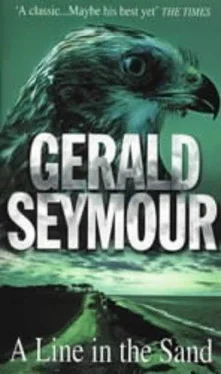Gerald Seymour - A Line in the Sand
Здесь есть возможность читать онлайн «Gerald Seymour - A Line in the Sand» весь текст электронной книги совершенно бесплатно (целиком полную версию без сокращений). В некоторых случаях можно слушать аудио, скачать через торрент в формате fb2 и присутствует краткое содержание. Жанр: Триллер, на английском языке. Описание произведения, (предисловие) а так же отзывы посетителей доступны на портале библиотеки ЛибКат.
- Название:A Line in the Sand
- Автор:
- Жанр:
- Год:неизвестен
- ISBN:нет данных
- Рейтинг книги:3 / 5. Голосов: 1
-
Избранное:Добавить в избранное
- Отзывы:
-
Ваша оценка:
- 60
- 1
- 2
- 3
- 4
- 5
A Line in the Sand: краткое содержание, описание и аннотация
Предлагаем к чтению аннотацию, описание, краткое содержание или предисловие (зависит от того, что написал сам автор книги «A Line in the Sand»). Если вы не нашли необходимую информацию о книге — напишите в комментариях, мы постараемся отыскать её.
A Line in the Sand — читать онлайн бесплатно полную книгу (весь текст) целиком
Ниже представлен текст книги, разбитый по страницам. Система сохранения места последней прочитанной страницы, позволяет с удобством читать онлайн бесплатно книгу «A Line in the Sand», без необходимости каждый раз заново искать на чём Вы остановились. Поставьте закладку, и сможете в любой момент перейти на страницу, на которой закончили чтение.
Интервал:
Закладка:
"I don't know what you'll learn about us from our toilets."
She had her back to the green and the house. She hadn't seen the cars come. They swept past her. She saw the child and a woman in the back seats of the lead car, and a man who had his head turned away sat in the front. There were cases in the second car, piled high, clearly visible in the rear window. Their headlights speared away into the early dusk.
The woman coughed deep in her throat, drew up the spittle, spat it out through her gaudy lips. She murmured, "They've gone. Damn good riddance."
Farida Yasmin shook. The shock swept through her. She watched the tail-lights disappear around the corner, at speed. Now she had learned something, but it was nothing that would help him. She began to walk briskly from the toilets, past the front of the hall.
The woman called after her, "Come and see me, when you start your interviews."
She had been cheated.
The bird hovered in the last of the afternoon's watery sunshine, then dived.
Beating its wings, it strutted close to him. He saw the wound. There was a tiny scrap of grease proof paper, the sort used to wrap the meat his mother brought home from the butcher in Lochinver, and he found soaked, muddied mince, buried in grass, where the bird had walked and pecked. As if it had been tamed, the bird came close to him. The head keeper had a peregrine falcon in a cage behind the house and near to his caravan: it had no fear of him because it had been fed by him since the day he'd found the abandoned fledgling, wounded by ravens. Andy Chalmers had come out of the marsh, stinking of it. The bird trusted him. Other than the head keeper, he knew of no man who would nurse an injured bird and win its trust. The head keeper was one of the very few men that the taciturn and sullen Andy Chalmers had respect for.
The dogs picked up the scent. They meandered either side of the path and crisscrossed over it. Without water to go into, it was hard even for a skilled man not to leave a scent for dogs.
He let them lead through the wood.
He felt a sense of burgeoning regret.
The dogs burst from the wood and tracked at the side of a grazing field. A car's lights illuminated the top of the hedgerows, receding. He went around the perimeter of the field.
He saw the tyre marks. He could smell the man and the marsh. The tyre marks were at the gate of a field, on the verge of the lane.
He wanted to go home. He had no hatred of a man who had nursed and fed a bird. He wanted to be back with his mountains. He called on the radio for Markham to come and collect him, and gave no explanation.
In the far distance, silhouetted against the darkening sky, was the shape of the church, and the shimmer of the village lights. It was not his place and not his quarrel, he had no business there.
Chapter Seventeen.
"You are certain?"
"It's what I saw."
In the rear car was the heap of suitcases on the back seat, and two men at the front. In the lead car were a child looking out through the window, a woman staring straight ahead, a man with his head turned away, and more men in the front she did not recognize; she had not seen the child before but the woman had been there, weeks earlier, when she had come to photograph the house.
Farida Yasmin had been walking up the road through the village when the two cars had come back past her, the same two men in the front of each but no passengers and no suitcases on the back seat of the second car.
She had walked on in the darkness. There was a cottage with an overgrown garden and a sold sign over a for-sale board, short of the church, on the other side of the road. The curtains were loosely drawn on the windows facing the road, but at the back of the house they were not pulled across and spilled light on to the garden. The grass at the back, ringed by untended flower-beds, was long and leaf-strewn. The shirt the child wore was bright red and there was a crest on the chest of rampant leopards and the logo sign of a vehicle-insurance company, the same shirt she had seen him wearing in the car. The child kicked the football round the grass. He played on his own, the hero and the star.
As soon as she'd met him at the field gate, she'd told him what she'd seen, and now she repeated it. In the car, as she'd blistered him with the information, he had seemed no more willing to believe her than he did now.
"The cars came back without him and his wife and the child. It was done fast, to deceive you, in the darkness. They've moved him to make it easier for themselves. Can't you see it? They've made a trap and now they don't have the responsibility of protecting him when it's sprung. They want you at the house on the green they want to kill you there when they don't have the responsibility for him."
"You are sure?" The doubt creased his voice.
She told him that she was sure. She had seen the boy, the child, with the football on the lawn lit by the back windows of the cottage. The trap was the house on the green where the guns waited for him. They were beside the car, in black darkness, among the scrub of the common ground beyond the village. It hurt her that she could not convince him.
"Don't you trust me? You should. Without me, on their terms, you would walk into a trap. Trust me. We are a partnership, that's equal parts don't you see that?"
She told him that he was nothing without her, and he seemed to reel away from her. She would go back, walk through the village a last time come back and tell him what she had seen. He squatted down, holding the launcher in his hands, as if it were a child's valued toy or a believer's relic. She told him how long she would be. He had already gobbled down the sandwiches she had brought him. He stank of the mud in the marsh and the still water. Farida Yasmin walked back into the village.
There were lights on in the church, throwing multi-colours through the high windows, and she could hear the organist practising.
Over the hedge she saw the child boot the ball into the far darkness beyond the spill of the light, and leap and whoop with pleasure as if he had found freedom.
She walked the length of the green. She saw the cars outside the house and the same drawn curtains as had been there before. She could see, from the street-light, that the camera set high on the front wall of the house tracked her, then lost interest, its lens veering away.
It was enough. She was certain.
She heard the rustle of a sweet-paper.
"Hello, it's the student, yes? My friend Peggy told me about you hope I didn't startle you, just walking the dog. I'm Paul. I'm your man when you start your interviews…"
She endured his patronizing talk as they went back past the green, the darkened house and the lens, through the village. It was useful to have him beside her when she went by the lens, when she was caught in the headlights of one of the moving cars. Walking with him gave her the appearance of being a part of the community… She told the man, Paul, that she would definitely find him when she came to do her interviews, and he left her at the pub.
The child was no longer in the garden. She saw the shape of a man through the gap in the curtains.
She cut off the road, stumbled across the common ground, wove between the gorse, trees and bramble thickets, to the car.
"It's as I said it was. I'm certain."
After she had bought the sandwiches for him she had gone to a chemist's in the town, and selected a perfume. Before he had come to the field gate she had anointed her body with it.
"I deserve to be trusted," Farida Yasmin whispered.
He was still hunched down beside the wheel of the car, holding the launcher. He had not moved.
"I want to be with you…"
His eyes stayed down, locked to the launcher and the ground at his feet.
Читать дальшеИнтервал:
Закладка:
Похожие книги на «A Line in the Sand»
Представляем Вашему вниманию похожие книги на «A Line in the Sand» списком для выбора. Мы отобрали схожую по названию и смыслу литературу в надежде предоставить читателям больше вариантов отыскать новые, интересные, ещё непрочитанные произведения.
Обсуждение, отзывы о книге «A Line in the Sand» и просто собственные мнения читателей. Оставьте ваши комментарии, напишите, что Вы думаете о произведении, его смысле или главных героях. Укажите что конкретно понравилось, а что нет, и почему Вы так считаете.












